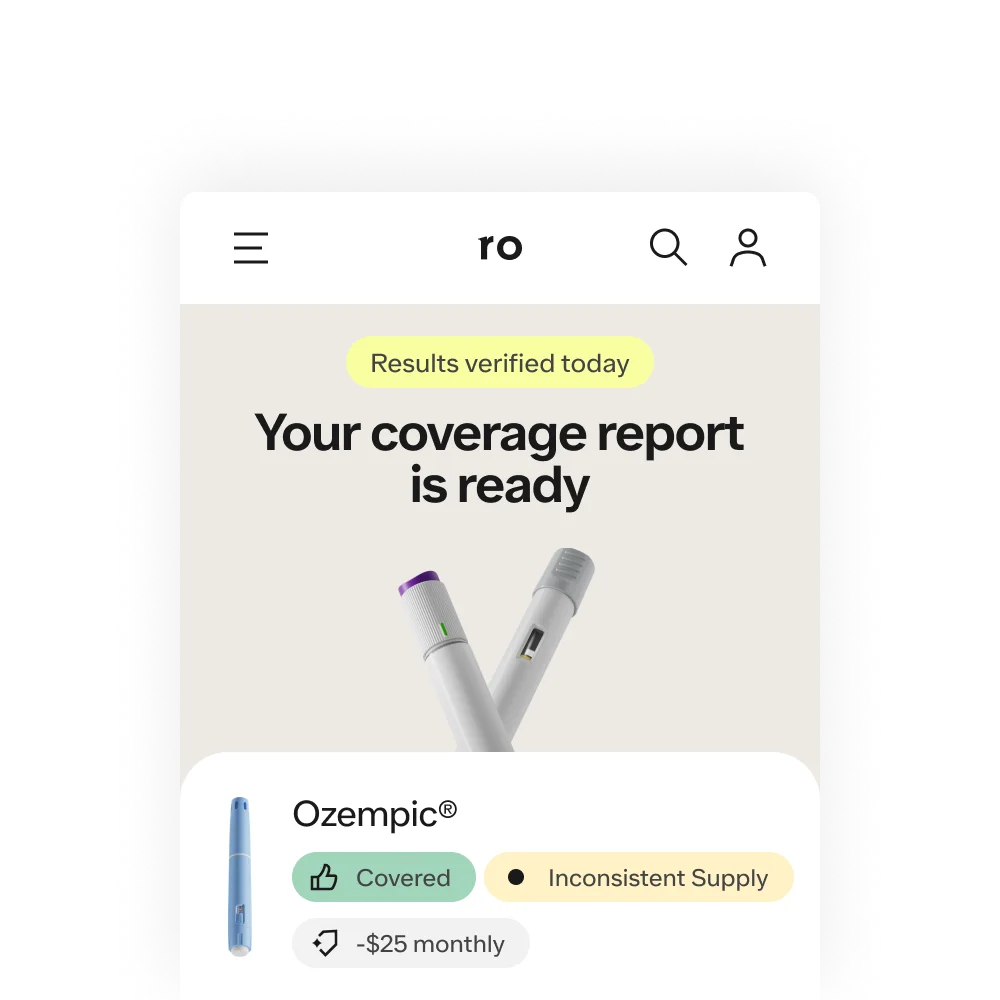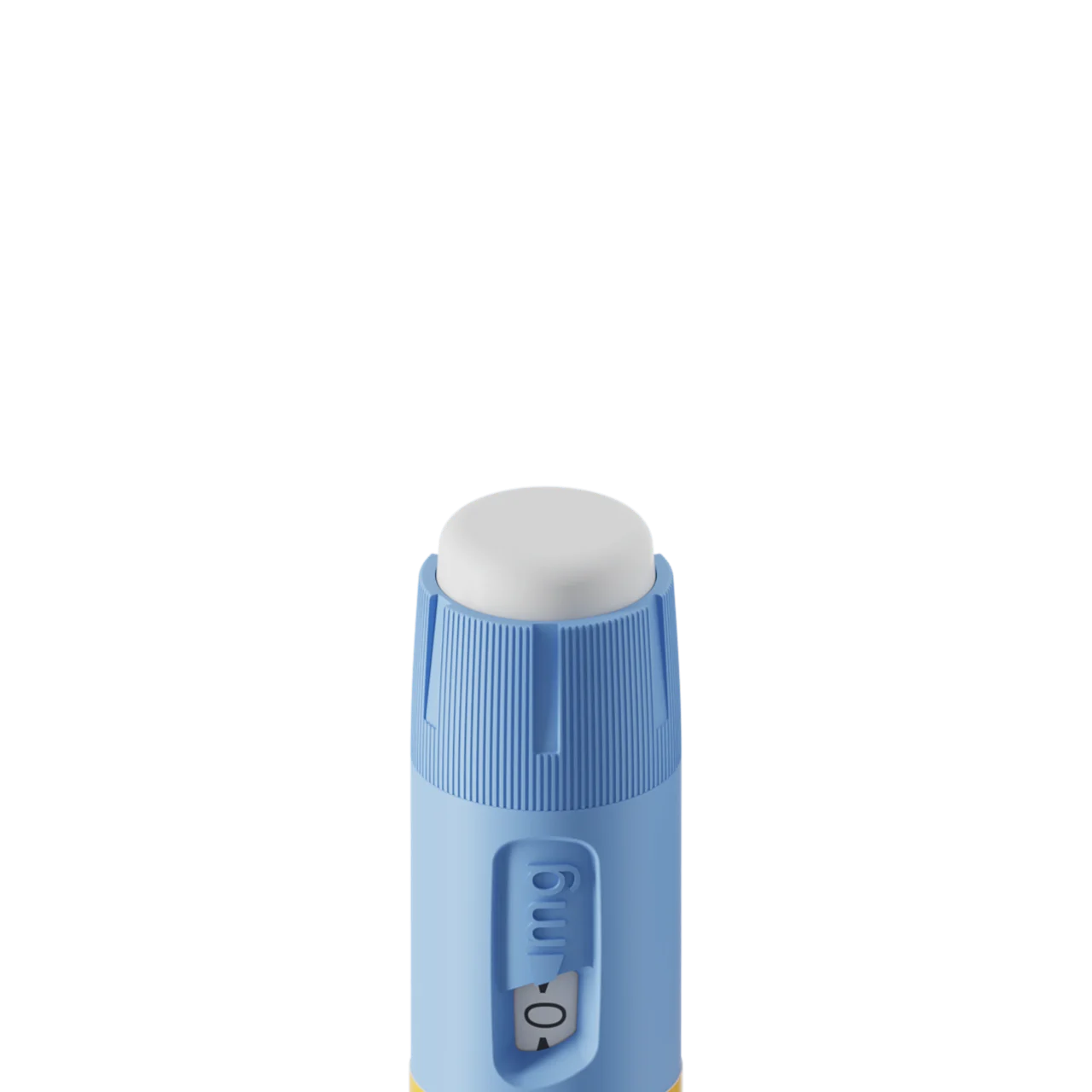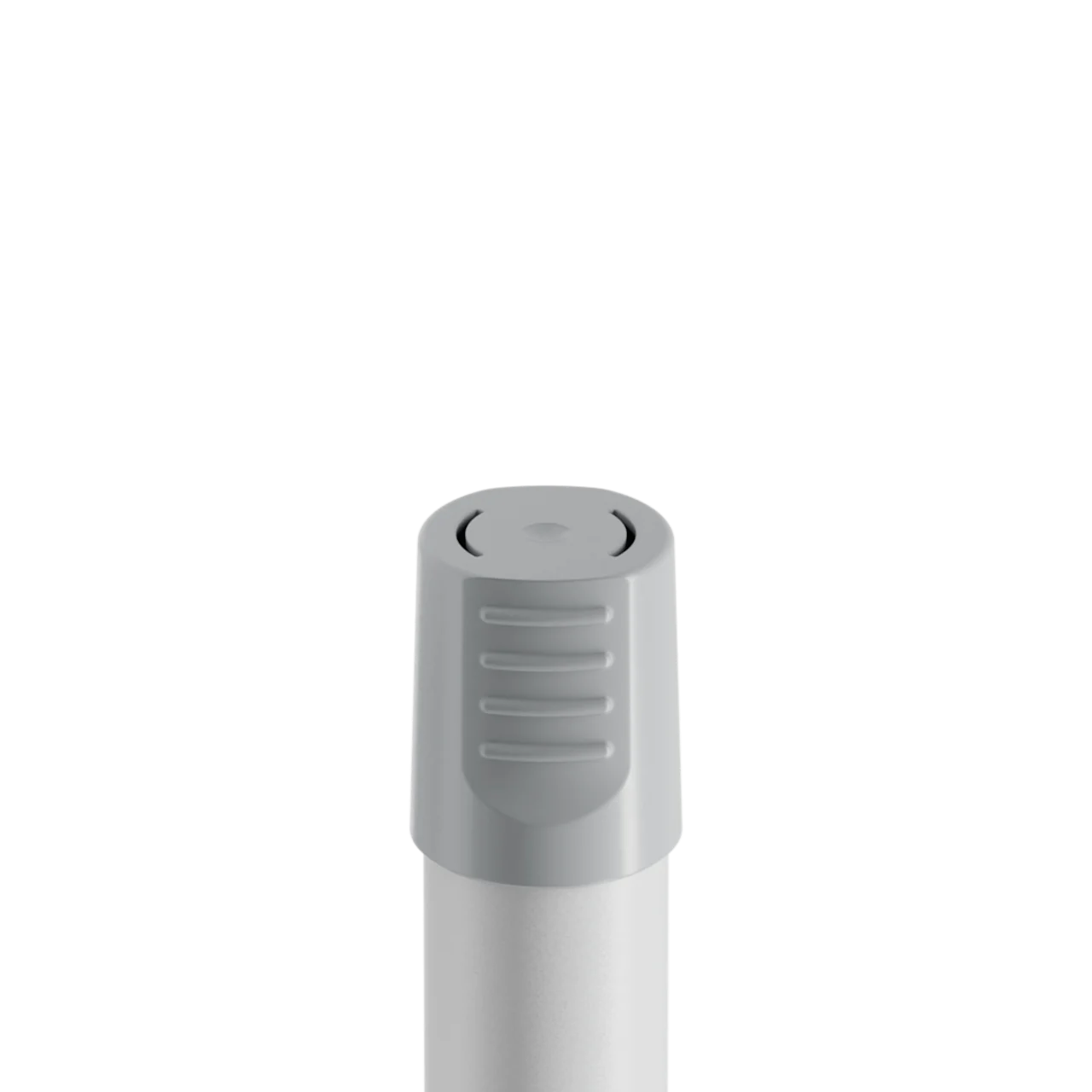Key takeaways
There’s no clear link between semaglutide and anxiety — but some people have reported feeling anxious or panicky after starting it.
Anxiety wasn’t a side effect in semaglutide clinical trials. And some research suggests that semaglutide users may actually be less likely to have anxiety.
After starting a new medication, paying attention to your mood can help you catch changes early and get the right support. If you notice new or worsening anxiety while taking semaglutide, contact your healthcare provider.
Here's what we'll cover
Here's what we'll cover
Here's what we'll cover
Key takeaways
There’s no clear link between semaglutide and anxiety — but some people have reported feeling anxious or panicky after starting it.
Anxiety wasn’t a side effect in semaglutide clinical trials. And some research suggests that semaglutide users may actually be less likely to have anxiety.
After starting a new medication, paying attention to your mood can help you catch changes early and get the right support. If you notice new or worsening anxiety while taking semaglutide, contact your healthcare provider.
Semaglutide (sold as Ozempic and Wegovy) is widely used for weight loss and type 2 diabetes. While the most common side effects are digestive, some people still ask: Can semaglutide cause anxiety? Here’s what the research shows.
Can semaglutide cause anxiety?
As weight loss medication becomes more and more popular, so does the buzz around potential side effects. New (and existing) weight loss medication users may wonder whether semaglutide (which you may know by the brand names such as Ozempic and Wegovy) can cause anxiety. The short answer is it’s not a common side effect, but it has been reported in some instances.
In large clinical trials, anxiety did not show up as a side effect. Most people experienced common side effects like nausea, stomach upset, or constipation instead. However, since the drug became more widely used, hundreds of people have posted on various social media platforms about feeling anxious, low in mood, or depressed after starting it.
These reports seem rare, but they’ve been enough to prompt researchers and regulators to take a closer look.
In 2023, the European Medicines Agency’s safety committee announced they would be reviewing data on GLP-1 receptor agonists like Ozempic, Wegovy, and Saxenda after reports of suicidal thoughts and self-injury in some users. But after reviewing the data, EMA’s safety committee announced that they found no evidence that GLP-1 medications cause suicidal thoughts or behaviors. The U.S. Food and Drug Administration (FDA) also conducted a similar investigation and found no clear evidence of a connection. The FDA also stated that a small risk cannot be completely ruled out and will continue to study the issue.
What the research says about semaglutide and anxiety
Does semaglutide make you anxious? Here’s what we know so far:
Big picture: Research shows that reports of mood-related side effects, including anxiety, make up only about 1% of all side effects linked to semaglutide and similar medications. It’s not considered one of the main issues healthcare providers see with this treatment.
Individual stories: There are some social media accounts and user reports of people who developed depression or anxiety symptoms after starting semaglutide, which improved once they stopped the medication.
Emerging research: An analysis of more than 8,200 reports in the FDA’s Adverse Event Reporting System (FAERS) found an association between GLP-1 medications (like semaglutide) and symptoms such as nervousness, stress, insomnia, and changes in eating behavior. But an association does not prove that the medications directly caused these effects.
Clinical trial evidence: An analysis of several clinical trials for weight loss, people taking semaglutide 2.4 mg had similar rates of anxiety and other mental health issues as those taking a placebo. This suggests semaglutide doesn’t seem to increase the risk of anxiety or other mood issues.
Link to less anxiety: A study of medical records of 4 million people found that semaglutide was linked to a lower likelihood of being diagnosed with anxiety — both in people with diabetes and in those without diabetes using it for weight loss. Again, a link does not prove a cause-and-effect relationship, but gives another clue to suggest that semaglutide isn’t likely to increase anxiety.
So, anxiety can occur while taking semaglutide, but the medication isn’t necessarily the cause. It’s important to pay attention to how you’re feeling and let a healthcare professional know if you experience new or worsening anxiety.
Why some people experience anxiety on semaglutide
We don't know for sure why anxiety on semaglutide can happen, but here are the most likely explanations:
Blood sugar changes
Blood sugar changes could explain the anxiety some people experience on semaglutide. Animal studies indicate that unstable blood sugar levels impact brain chemistry and stress pathways, which in turn influence mood.
Because semaglutide can lower blood sugar, some people notice changes in how they feel as their body adjusts. In studies with diabetic mice, semaglutide actually reduced anxiety-like behaviors.
Blood sugar changes are one possible explanation, but further research in humans is needed to confirm this.
Rapid weight loss stress
Some people taking semaglutide lose weight fairly quickly, and that shift can bring emotional changes along with the physical ones. Research in other areas, like bariatric surgery and even studies of athletes who undergo rapid weight loss, suggests that adjusting to changes in the body, new routines, and changes in eating affects mood.
While there aren’t clear studies directly linking semaglutide-related weight loss to anxiety, some people have shared personal stories online about feeling more anxious or even experiencing panic attacks during their weight-loss journey.
These accounts don't prove cause and effect, but they do show that rapid body changes feel stressful for some people.
Nausea and physical discomfort
Stomach upset is one of the most common side effects reported by people taking semaglutide. Some experience nausea, while others deal with symptoms like vomiting, stomach pain, constipation, or diarrhea. For most, these side effects ease over time, but when they linger, they can feel draining.
Feeling sick day after day can make it hard to relax or focus, and could possibly contribute to stress or anxious feelings. While there isn’t strong evidence that nausea directly causes anxiety, it’s easy to see how persistent discomfort could affect your mood.
Semaglutide and panic attacks
Panic attacks are not a common side effect of semaglutide. However, there have been scattered reports of people experiencing panic-like symptoms after starting the medication.
In one firsthand account, a person described experiencing severe chest pain during the first month of treatment and called paramedics to rule out a heart attack. After testing showed no heart issues, their clinician suggested the symptoms were likely related to a panic attack, based on their mental health history.
Keep in mind that symptoms such as headaches, dizziness, or fatigue can also be side effects of semaglutide itself. These physical sensations may feel alarming and, in some cases, could be mistaken for or contribute to panic. Because side effects and anxiety can overlap, it isn’t always easy to tell them apart without medical guidance.
So far, research hasn’t shown panic attacks to be a direct or common effect of semaglutide, but a small number of people have reported them.
How to manage anxiety while taking semaglutide
If you notice anxious feelings while taking semaglutide, here are a few steps that can help. Remember, these are general strategies, not a substitute for medical care.
Track your symptoms: Keep a simple log of when anxiety shows up and what else is happening (such as dose changes, meals, or sleep). This can make it easier to notice patterns.
Support your body: Regular meals, good sleep, hydration, and light activity like walking or stretching can ease side effects and stress. Studies show these simple habits can help reduce symptoms of anxiety and improve mood.
Practice calming routines: Breathing exercises can reduce feelings of anxiety.
Talk it over: Share what you’re experiencing with a healthcare provider. They can help rule out other causes and decide if your medication plan needs adjusting.
Lean on support: Friends, family, or support groups can be a good outlet for talking about both the physical and emotional parts of the treatment journey.
While there’s no one-size-fits-all approach, paying attention to how you feel and seeking guidance early can make the process easier to manage.
When to contact your healthcare provider
While occasional stress or worry are normal, if anxious feelings become frequent, feel overwhelming, or interfere with daily life, it’s important to reach out to a healthcare provider.
You should seek help if you have:
Ongoing anxious thoughts that are hard to control or feel overwhelming.
Physical symptoms like a pounding heartbeat, unexplained aches, or trouble sleeping.
Changes in behavior, such as avoiding activities or social situations you usually enjoy.
Anxiety disorders are common and treatable, but many people don’t realize support is available.
A provider can help you explore options, which may include therapy, lifestyle changes, or medications when needed. Family or close friends can also play an important role in offering support and encouraging you to make the best choice for your wellbeing.
Rx weight loss with Ro
Get access to prescription weight loss medication online
Bottom line: does semaglutide cause anxiety?
While anxiety is not considered one of the main side effects of semaglutide, a small number of people have reported it. Does that mean Semaglutide can cause anxiety? The research doesn't show a strong link, but a few things may help explain why it happens to some:
Physical factors may play a role: Shifts in blood sugar, rapid weight loss, and common side effects like nausea or stomach discomfort could all contribute to feelings of unease or anxiety in certain people.
Panic attacks are rare but reported: A few accounts describe panic-like symptoms, though these are not considered typical effects of the medication. Since some side effects feel similar to anxiety symptoms, it can be tough to know which is which.
Seek support if needed: If anxiety becomes persistent, distressing, or affects daily life, it’s important to talk with a healthcare provider before making any changes to your treatment.
Frequently asked questions (FAQs)
Does Wegovy cause anxiety?
No, Wegovy hasn’t been shown to cause anxiety directly. However, it can increase the risk of low blood sugar in people with type 2 diabetes, especially if combined with medicines like insulin or sulfonylureas.
Anxiety can sometimes be a symptom of low blood sugar, along with dizziness, sweating, or a fast heartbeat. If you’re taking Wegovy, it’s important to know how to recognize low blood sugar and check your levels regularly.
Does Ozempic cause anxiety?
No, anxiety is not a common side effect of Ozempic. But Ozempic can raise the risk of low blood sugar in people with type 2 diabetes when used with other diabetes medicines, and anxiety may be one of the signs of low blood sugar.
While most people don’t experience anxiety from Ozempic itself, it’s helpful to be aware of how low blood sugar can feel.
Can semaglutide affect your mental health?
Yes, it’s possible for semaglutide to affect your mental health. But most people do not report mood changes on semaglutide, and large clinical trials haven’t shown a strong link with anxiety or depression. Still, social media reports show that mood shifts do happen in some situations.
Will anxiety from semaglutide go away?
Yes, it can. In fact, a large study found that people taking semaglutide for weight loss or diabetes were less likely to have anxiety If symptoms persist or worsen, check in with a healthcare provider.
Should I stop taking semaglutide if I feel anxious?
No, if you feel anxious, you shouldn't stop taking semaglutide without medical guidance.. If you feel new or worsening anxiety, contact your healthcare provider.
They can help determine whether the symptoms are likely linked to semaglutide or something else, and whether it makes sense to adjust or stop the medication.
DISCLAIMER
If you have any medical questions or concerns, please talk to your healthcare provider. The articles on Health Guide are underpinned by peer-reviewed research and information drawn from medical societies and governmental agencies. However, they are not a substitute for professional medical advice, diagnosis, or treatment.
Ozempic Important Safety Information: Read more about serious warnings and safety info.
Wegovy Important Safety Information: Read more about serious warnings and safety info.
GLP-1 Important Safety Information: Read more about serious warnings and safety info.
Saxenda Important Safety Information: Read more about serious warnings and safety info.
References
Amiri, S., Mahmood, N., Javaid, S. F., et al. (2024). The Effect of Lifestyle Interventions on Anxiety, Depression and Stress: A Systematic Review and Meta-Analysis of Randomized Clinical Trials. Healthcare (Basel, Switzerland), 12(22), 2263. doi: 10.3390/healthcare12222263. Retrieved from https://pubmed.ncbi.nlm.nih.gov/39595461/
Arillotta, D., Floresta, G., Guirguis, A., et al. (2023). GLP-1 Receptor Agonists and Related Mental Health Issues; Insights from a Range of Social Media Platforms Using a Mixed-Methods Approach. Brain Sciences, 13(11), 1503. doi: 10.3390/brainsci13111503. Retrieved from https://pmc.ncbi.nlm.nih.gov/articles/PMC10669484/
Bentley, T. G. K., D'Andrea-Penna, G., Rakic, M., et al. (2023). Breathing Practices for Stress and Anxiety Reduction: Conceptual Framework of Implementation Guidelines Based on a Systematic Review of the Published Literature. Brain Sciences, 13(12), 1612. doi: 10.3390/brainsci13121612. Retrieved from https://pmc.ncbi.nlm.nih.gov/articles/PMC10741869/
Chen, W., Cai, P., Zou, W., et al. (2024). Psychiatric adverse events associated with GLP-1 receptor agonists: a real-world pharmacovigilance study based on the FDA Adverse Event Reporting System database. Frontiers in Endocrinology, 15, 1330936. doi: 10.3389/fendo.2024.1330936. Retrieved from https://pubmed.ncbi.nlm.nih.gov/38390214/
Epic Research. (2024). Most GLP-1 medications correlated with a lower likelihood of anxiety and depression diagnoses. Retrieved from https://www.epicresearch.org/articles/most-glp-1-medications-correlated-with-a-lower-likelihood-of-anxiety-and-depression-diagnoses
European Medicines Agency. (2023). EMA statement on ongoing review of GLP-1 receptor agonists. Retrieved from https://www.ema.europa.eu/en/news/ema-statement-ongoing-review-glp-1-receptor-agonists
European Medicines Agency (EMA). (2024). Meeting highlights from the Pharmacovigilance Risk Assessment Committee (PRAC): 8–11 April 2024. Retrieved from https://www.ema.europa.eu/en/news/meeting-highlights-pharmacovigilance-risk-assessment-committee-prac-8-11-april-2024
Kommu, S. & Whitfield, P. (2024). Semaglutide. StatPearls. Retrieved on Nov. 3, 2025 from https://www.ncbi.nlm.nih.gov/books/NBK603723/
Moiz, A., Levett, J. Y., Filion, K. B., et al. (2024). Long-Term Efficacy and Safety of Once-Weekly Semaglutide for Weight Loss in Patients Without Diabetes: A Systematic Review and Meta-Analysis of Randomized Controlled Trials. The American Journal of Cardiology, 222, 121–130. doi: 10.1016/j.amjcard.2024.04.041. Retrieved from https://pubmed.ncbi.nlm.nih.gov/38679221/
Nishida, K., Chrétien, B., Dolladille, C., et al. (2025). Psychiatric and psychological adverse effects associated with dulaglutide, semaglutide, and liraglutide: A vigibase study. Clinical Nutrition (Edinburgh, Scotland), 51, 252–265. doi: 10.1016/j.clnu.2025.06.011. Retrieved from https://pubmed.ncbi.nlm.nih.gov/40617160/
Office of Disease Prevention and Health Promotion. (2025). Talk with your doctor about anxiety. U.S. Department of Health and Human Services. Retrieved from https://odphp.health.gov/myhealthfinder/doctor-visits/screening-tests/talk-your-doctor-about-anxiety
Okamoto, A., Yokokawa, H., Nagamine, T., et al. (2021). Efficacy and safety of semaglutide in glycemic control, body weight management, lipid profiles and other biomarkers among obese type 2 diabetes patients initiated or switched to semaglutide from other GLP-1 receptor agonists. Journal of Diabetes and Metabolic Disorders, 20(2), 2121–2128. doi: 10.1007/s40200-021-00899-9. Retrieved from https://pmc.ncbi.nlm.nih.gov/articles/PMC8630305/
Piątkowska-Chmiel, I., Wicha-Komsta, K., Pawłowski, K., et al. (2025). Beyond Diabetes: Semaglutide's Role in Modulating Mood Disorders through Neuroinflammation Pathways. Cellular and Molecular Neurobiology, 45(1), 22. doi: 10.1007/s10571-025-01534-4. Retrieved from https://pmc.ncbi.nlm.nih.gov/articles/PMC11891103/
Reddit. (2024). My experience with Ozempic panic attacks/anxiety. r/Ozempic. Retrieved from https://www.reddit.com/r/Ozempic/comments/17vnv11/my_experience_with_o_panic_attacksanxiety/
Tobaiqy, M. & Elkout, H. (2024). Psychiatric adverse events associated with semaglutide, liraglutide and tirzepatide: a pharmacovigilance analysis of individual case safety reports submitted to the EudraVigilance database. International Journal of Clinical Pharmacy, 46(2), 488–495. doi: 10.1007/s11096-023-01694-7. Retrieved from https://pmc.ncbi.nlm.nih.gov/articles/PMC10960895/
U.S. Food and Drug Administration (FDA). (2024). Update on FDA’s ongoing evaluation of reports of suicidal thoughts or actions in patients taking certain type 2 diabetes and obesity medicines. Retrieved from https://www.fda.gov/drugs/drug-safety-and-availability/update-fdas-ongoing-evaluation-reports-suicidal-thoughts-or-actions-patients-taking-certain-type
U.S. Food and Drug Administration (FDA-a). (2025). Highlights of prescribing information: Ozempic (semaglutide) injection, for subcutaneous use. Retrieved from https://www.accessdata.fda.gov/drugsatfda_docs/label/2025/209637s025lbl.pdf
U.S. Food and Drug Administration (FDA-b). (2025). Highlights of prescribing information: Wegovy (semaglutide) injection, for subcutaneous use. Retrieved from https://www.accessdata.fda.gov/drugsatfda_docs/label/2025/215256s024lbl.pdf



















